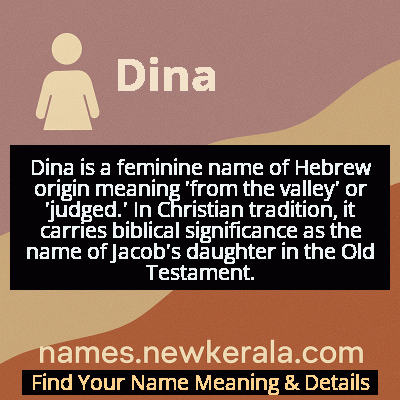Dina Name Meaning & Details
Origin, Popularity, Numerology Analysis & Name Meaning of Dina
Discover the origin, meaning, and cultural significance of the name DINA. Delve into its historical roots and explore the lasting impact it has had on communities and traditions.
Name
Dina
Gender
Female
Origin
Christian
Lucky Number
1
Meaning of the Name - Dina
Dina is a feminine name of Hebrew origin meaning 'from the valley' or 'judged.' In Christian tradition, it carries biblical significance as the name of Jacob's daughter in the Old Testament.
Dina - Complete Numerology Analysis
Your Numerology Number
Based on Pythagorean Numerology System
Ruling Planet
Sun
Positive Nature
Leaders, ambitious, highly driven, self-reliant, innovative.
Negative Traits
Overly aggressive, domineering, impatient, selfish.
Lucky Colours
Red, orange, gold.
Lucky Days
Sunday.
Lucky Stones
Ruby, garnet.
Harmony Numbers
2, 3, 9.
Best Suited Professions
Entrepreneurs, managers, engineers.
What People Like About You
Courage, determination, leadership.
Famous People Named Dina
Dina Merrill
Actress and Socialite
Hollywood actress known for roles in 'Desk Set' and 'Butterfield 8', also noted for her philanthropic work
Dina Manzo
Television Personality
Star of 'The Real Housewives of New Jersey' and founder of Project Ladybug charity
Dina Titus
Politician
U.S. Representative for Nevada's 1st congressional district since 2013
Dina Asher-Smith
Athlete
British sprinter, world champion and national record holder in 200 meters
Name Variations & International Equivalents
Click on blue names to explore their detailed meanings. Gray names with will be available soon.
Cultural & Historical Significance
In Christian tradition, while Dinah appears less frequently than other biblical women, her story has been used in theological discussions about justice, family dynamics, and the treatment of women. The name gained popularity among early Christians as a symbol of judgment and vindication. Across Arabic-speaking cultures, Dina (often spelled Dina or Deena) carries meanings related to religion and faith, with some interpretations connecting it to 'way of life' or 'religion,' making it popular among Muslim communities as well.
The name's cross-cultural appeal demonstrates its versatility and enduring significance. In modern times, Dina serves as a bridge between different religious traditions while maintaining its strong biblical foundation, making it a meaningful choice for families valuing both cultural heritage and contemporary relevance.
Extended Personality Analysis
Women named Dina are often perceived as strong-willed, independent, and deeply intuitive individuals. They tend to possess a natural grace and emotional intelligence that allows them to navigate complex social situations with ease. Many Dinas demonstrate a blend of traditional values with modern thinking, creating a unique balance between respect for heritage and forward-looking perspectives. Their name's biblical origins often contribute to an aura of wisdom and depth that others find compelling.
In interpersonal relationships, Dinas are typically loyal friends and devoted family members who value deep connections over superficial interactions. They often exhibit a protective nature toward loved ones and can be fiercely defensive of those they care about. Professionally, they tend to excel in careers that require empathy, communication skills, and strategic thinking. The valley symbolism in their name's meaning sometimes manifests as a personality that can weather emotional storms while maintaining inner strength and resilience.
These personality characteristics often make Dinas natural leaders and mediators, capable of bringing people together and finding common ground. Their combination of strength and sensitivity allows them to adapt to various situations while remaining true to their core values and principles.
Modern Usage & Popularity
In contemporary times, Dina maintains steady popularity as a classic yet distinctive name choice. While it peaked in usage during the mid-20th century, particularly in the 1950s-1970s, it continues to be selected by parents seeking a name with biblical roots that feels both traditional and accessible. The name enjoys consistent usage across English-speaking countries, with particular strength in the United States, United Kingdom, and Canada. Recent trends show a slight resurgence as vintage names become fashionable again, with many parents appreciating its simplicity and strong cultural heritage. It remains popular in Christian communities while also crossing cultural boundaries, appearing in diverse demographic groups and maintaining a presence that is neither overly common nor obscure.
Symbolic & Spiritual Meanings
Symbolically, Dina represents the concept of the valley - not as a place of depression, but as a fertile ground for growth and transformation. Valleys in symbolic language often represent places of shelter, nourishment, and preparation for ascending to higher places. The name carries connotations of judgment and justice from its Hebrew roots, suggesting a person who seeks truth and fairness. Metaphorically, Dina symbolizes the journey through challenges to reach places of abundance, much like biblical valleys that provided sustenance and protection. The name also embodies the idea of being grounded while maintaining spiritual depth, representing someone who can navigate both the highs and lows of life with equal grace and emerge stronger from difficult experiences.

